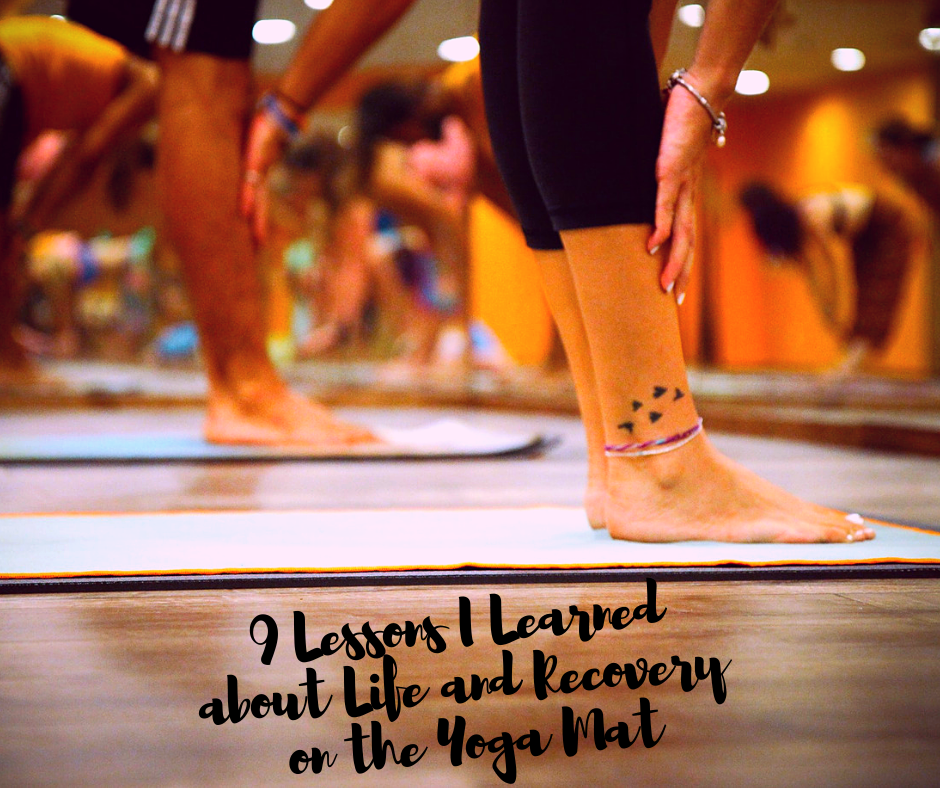If someone had told me ten years ago that Bikram Yoga would be an integral part of my future recovery process I would have laughed. A lot. Because I have the flexibility of a Chip and Joanna Gaines farmhouse table – or perhaps an elegant rhinoceros. Then I would have secretly whispered the Lord’s Prayer *just in case* because I still have a lingering fear that yoga = demonic possession. This fear is of course based on the super informative VHS tape I was forced to watch in my high school youth group that told the room of impressionable teens that if we took yoga we were basically asking demons to inhabit our body. Luckily seminary and pastoral counseling have helped squelch this fear. Mostly.
Nevertheless, when my life fell apart a few years ago, I turned to exercise to fight the feelings of loneliness and depression. At the time, running was my drug of choice. However, as with anything, abuse and overuse lead to injury in the form of plantar fasciitis, which took me off the trails for a long time. In addition to the foot injury, I began to experience medical issues that all stemmed from “stress” which is a cute word doctors use for “life.” This led me to a Bikram studio.
For those of you unfamiliar with this practice, Bikram is a special form of yoga which takes place in a room heated between 95 and 105 degrees with 40% humidity. The class repeats the same 26 postures for 90 minutes. Being a masochist, this seeemed like the perfect amount of torture for me so I decided to sign up.
After showing up to my first class, I took a spot in the back corner and tried to touch my toes. Nope. I looked around for any signs of satan’s army. So far we were in the clear. My yoga instructor introduced herself with the most perfect yoga name ever, Sywann (is this a prerequisite for yoga teachers?). And off we went. I found the repetition and warmth to be quite soothing. The silence gave me a space to reconnect with God. I realized that centering my schedule around therapy and yoga might be the perfect combination I needed for healing.
Over time, I began to notice overlap between the lessons I was being taught in therapy and those learned on the mat. In an attempt to save you thousands of dollars on therapy and a heat stroke, here are my takeaways.
Lessons about Life and Recovery on the Yoga Mat
Stop comparing out and focus on yourself.
I’m not sure when I began to measure my success by comparing myself to others, but I’m pretty sure it was around birth. In yoga, if you spend your time watching others you will lose your balance or possibly even injure yourself. I think there is some truth to this in life as well. A common mantra in my therapy groups has been “Don’t compare out.” By hearing this message again in a yoga studio, it is finally starting to resonate with me. Everyone’s practice is different, just like everyone’s lives, choices, and recovery are different. Stay in your lane and focus on what you need to do to be the best version of yourself you can be.
Listen to your body.
A major component of both yoga and trauma recovery is learning to trust and listen to your body again. While you might encounter some instructors that push you to feel pain, a true yogi will teach you to listen to your own body. The same is true when doing life. It takes time, but getting in touch with your body allows you to determine how to best care for yourself. Perhaps you’ve pushed yourself too hard and need to take a break. Maybe the stomachache is a signal of anxiety. Paying attention to your body allows you to notice your emotions with curiosity rather than judgement. Why do I feel angry? Is there a boundary being violated that I need to address? Our bodies are great barometers of our emotional and spiritual health if we allow them to do their job.
Drink water. Eat well. Sleep well.
Pro-tip – if you come into a 100 degree room without having hydrated well that morning or after eating garbage the night before, it will not end well for you. The deeper you get into your yoga practice, the more you realize how everything is connected – the food you eat, the alcohol you consume, the hours you sleep. When recovering from addiction, grief, or divorce, it is important that you are intentional about taking care of your body. It matters. Stay hydrated and eat foods that make you feel well.
Today is different than yesterday and tomorrow.
Okay, I don’t understand this, but one day I can do eagle pose perfectly fine and the next I am falling all over myself like a squirrel who found a fermented pumpkin. Dancer pose might feel impossible for weeks, then one day your leg is up in the air like a majestic gazelle. The same is true of life and recovery. You might make great strides in healing, when suddenly one day you wake up and feel like you can’t get out of bed. You might feel as though life is impossible, then on Tuesday you decide to go for a walk, then you call a friend on Wednesday, and things feel more manageable until Friday you are back in the fetal position. Give yourself some grace to be whatever you need to be that day and then let it go. Tomorrow might feel totally different.
Air out your dirty laundry.
I’m not sure if this really sunk in for you, but Bikram is hot. Like really hot. So hot that afterwards you look like you’ve been soaking in a tub and your fingers are often wrinkly. Imagine then putting those clothes and towels into a bag in the back of your car on a Virginia summer day and going about your business. Unfortunately I have forgotten to air these guys out and it is NOT pleasant. This is tricky for recovery. Many of us grew up in households and communities that subscribed to the phrase “Don’t air out your dirty laundry.” Family secrets, addictions, pain, and grief were all wadded up and tucked away in a pile never to be addressed. I’m not saying you should spew your truth and your story out everywhere, just like I wouldn’t recommend that you air out your Bikram clothes in your office or in a Walmart. However, you’ve got to find a safe space to work through your grime or it will sour and spoil and create a much harder situation to deal with. Therapy, pastoral counseling, support groups, a few safe and trusted friends – reach out and find your laundry spot. In this digital age, you can even get online therapy if you don’t have many options near you. (For more on this, read Pretty Addictions here).
Take time to heal old injuries before moving forward.
Historically I have exactly zero patience for this. Through years of team sports and my competitive nature I learned to ignore my body’s signals and charge forward. Nevermind the fact that I still have a bone spur in my shoulder from years of softball and volleyball or an old knee injury from running and my first attempts at yoga a decade ago. The same is true for recovery and relationships. You cannot possibly build a new relationship until you give yourself time to heal. You have to strengthen the correct muscles and learn proper alignment and best practices before you can go into a new relationship and expect anything other than a new injury. (Plus, dating is insane. Don’t believe me? Read this).
Stay in the room
For your first class, the only request from the instructors is that you stay in the room. If you feel overwhelmed from the heat, you can lie down and take a break. However, part of the challenge is to simply stay put and sit through the discomfort. In recovery, there will be a lot of discomfort. If you are truly trying to do this in a healthy way, then you’ll learn that part of recovery is allowing yourself to feel your feelings rather than mask, avoid, or self-medicate with other unhealthy options. It’s hard, but I promise the feelings won’t last forever. Sadly, I have been around many women who have struggled with suicidal thoughts following divorce, death, or trauma. However, you need to stay in the room. You will survive it and you will get through it. So just stay in the room. It will get better.
Community can make all the difference.
The beauty of the Bikram studio is that you get to go on this physical and spiritual journey alongside others. Often in the locker room you will hear women applauding one another’s successes and growths, while encouraging them to take it easy if they need to. I fully believe God built us for community, and there is not a more critical time when this is needed than when you are working through trauma. Having others beside you with similar circumstances to commiserate, lift you up, and get angry on your behalf is life changing. Don’t try to do it alone. Find a support group.
Everything is for a season.
After two years of membership in Bikram, my flexibility is still questionable, but I’ve seen a lot of benefits to my practice. I’ve learned proper alignment, I’ve discovered the connection between my body and my spirituality, and I can kind of touch my toes now. However, I believe the comfort of the studio has served its purpose, and now it is time for me to leave. The commute is no longer manageable given my recent move, and I need to make space to enter into a new phase of healing. For the darkest part of my recovery, it was appropriate for me to create a schedule centered around yoga and therapy. However, now I’m ready to dive in and invest my time and energy into music, writing, and speaking. I will still continue my yoga practice at home after praying the Lord’s prayer five times and burning sage to cast out demons. But I’m recognizing that my next chapter needs some attention to get things where I want to be, and I’m excited to see where this takes me.
Get ready y’all, because you’re about to hear a lot more from me.



